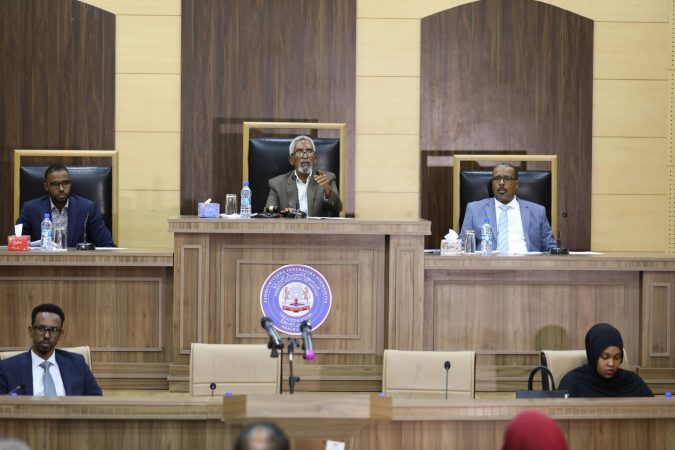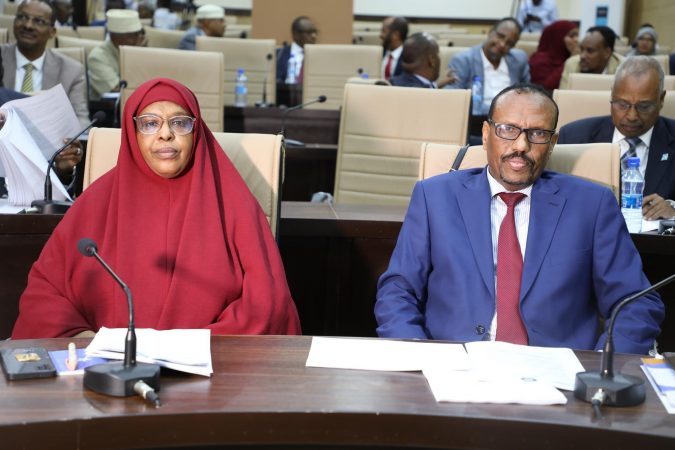The Federation of Somali Trade Unions (FESTU), Somalia’s apex labour body, takes great pride in extending its profound appreciation for the historic passage of the Environmental Management Bill by the Upper House (Senate) of the Federal Parliament today. This momentous achievement signifies the culmination of an extensive legislative journey, involving deliberations in the Lower House (House of the People) of the Federal Parliament, comprehensive stakeholder consultations, and the endorsement of the Council of Ministers of the proposed text of the Bill. This decisive moment signifies a notable advancement towards the creation of a sustainable and equitable future for Somalia.

A remarkable highlight within this milestone is the inclusion of a standalone article dedicated to the principle of Just Transition within the Bill. This ground-breaking achievement positions Somalia as a pioneering African nation, formally enshrining the principle of Just Transition into its legal framework. This critical provision empowers the Federal Government of Somalia, in collaboration with social partners and stakeholders, to formulate and adopt a comprehensive national policy for Just Transition. This policy ensures a transparent and impartial transition for workers and their families in the face of evolving environmental dynamics.
“The importance of the Just Transition principle cannot be overstated, particularly for workers and their families who often bear a disproportionate burden due to the impacts of climate change-induced environmental crises,” stated Omar Faruk Osman, General Secretary of FESTU. “This principle serves as a safeguard, ensuring that amidst complex environmental and economic shifts, workers’ livelihoods, rights, and well-being remain protected. It signifies a balanced equilibrium that prevents the displacement or vulnerability of workers and marginalized groups during inevitable energy and economic transitions.”

The integration of Just Transition principles into the Environmental Management Bill underscores Somalia’s proactive dedication to mitigating the adverse effects of climate change. This strategic alignment with international agreements, notably the Paris Agreement and consequential decisions such as the establishment of the Just Transition Working Programme (JTWP) during COP27, bridges the gap between environmental sustainability and the protection of fundamental rights. This synergy fosters a harmonious coexistence between nature and society, nurturing principles of justice throughout the transition process.
The implementation of Just Transition deeply resonates with the steadfast pursuit of social justice championed by Somali trade unions under FESTU’s umbrella. This principle is a testament to organized labour’s unwavering dedication to safeguarding the rights of vulnerable populations, amplifying the voices of marginalized individuals, spearheading social dialogue, and ensuring inclusivity amid transformative change. By embedding Just Transition within the fabric of Somali legislation, Somalia envisions a future where equity, environmental preservation, and progress harmoniously coexist as the bedrock of a just society.
FESTU commends the Federal Government of Somalia and, in particular, the Ministry of Environment and Climate Change, for their visionary leadership in shaping an inclusive and progressive Bill. Their commitment to crafting a robust legal framework that prioritizes environmental protection, defence of basic rights and the welfare of the working people on a sustainable basis is commendable.
Furthermore, FESTU extends gratitude to the Parliamentary Committees responsible for environmental matters in both Houses of the Federal Parliament. Their unwavering support and recognition of the value of social dialogue have paved the way for an inclusive and forward-looking approach in the development of this significant Environmental Bill.
This achievement has been fortified by the steadfast support of the Dutch trade union solidarity support organization Mondiaal FNV, which provided support from the Ministry of Foreign Affairs of the Netherlands to facilitate the crusade to realise just transition through social dialogue. This support, coupled with active engagement with government bodies and parliamentary entities, has ensured the realization of workers’ call for the incorporation of Just Transition provisions in the Bill.
Additionally, FESTU’s unwavering commitment to climate justice, spanning several years, has been made possible through financial support from the Stockholm-based Olof Palme International Centre and the International Labour Organization (ILO). Both entities have provided invaluable assistance throughout this process with the backing of the International Trade Union Confederation (ITUC) and African Regional Organisation ITUC-Africa.
As FESTU and its affiliated trade unions stand on the cusp of a historic transformation, the inclusion of just transition provisions within the Environmental Management Bill resonates deeply with the collective aspirations of organized labour for a future that prioritizes the well-being of Somali workers, vulnerable communities, and environmental preservation.
“This milestone underscores trade unions’ dedication to a Somalia characterized by sustainable progress, equitable growth, and environmental preservation, based on strategies aimed at urgently combating climate change and its ramifications through social dialogue,” emphasized Osman.
Somalia’s transition towards a cleaner and more sustainable economy will inherently yield job opportunities for many while potentially leading to job transformations, losses, and replacements for others. This underscores the need for coherent policies to maximize opportunities and mitigate the social costs of the transition. The transition to a green economy must be accompanied by deliberate strategies to ensure social inclusivity and sustainability.
Moving forward, adapting to ongoing climate change is crucial. Somalia’s Nationally Determined Contributions (NDCs) offer a valuable foundation upon which stakeholders can design and implement appropriate actions to address this pressing challenge. It is imperative to integrate adaptation and mitigation objectives into Somalia’s national environment policy and programs, developed in consultation with a broad spectrum of stakeholders, including social partners and representatives of local communities. This collective approach will be pivotal in realizing the environmental and social aspirations of our nation.
